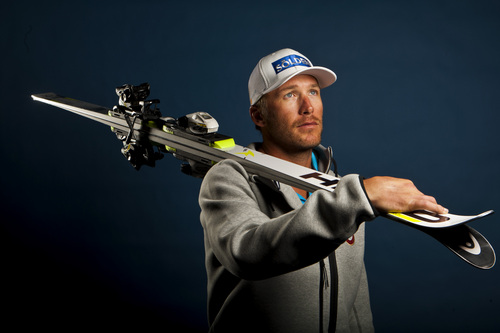This is an archived article that was published on sltrib.com in 2013, and information in the article may be outdated. It is provided only for personal research purposes and may not be reprinted.
Park City
The scripted part was good stuff, and there was much, much more from Bode Miller. Whatever subject anybody figured to pursue from Monday's gathering of 2014 Olympic athletes in advance of the Winter Games in Sochi in February was overrun by the Bode Express.
In this case, that's a compliment.
The veteran skier who appeared during the the 2013 Team USA Media Summit was alternately playful, thoughtful, irreverent and rational — as always. He'll never play along with a line of questioning, but he'll deliver quality material.
Warning: Interview transcripts create major problems with this guy, because they could never properly convey Miller's tone.
In other words, he's not suddenly "motivated entirely by money and medals" now. And he actually was impressed by the historic performance of Park City's Ted Ligety in the World Championships, never mind his wry disclaimer.
Having said that, he was quite serious in describing Russia's anti-gay legislation as "absolutely embarrassing … intolerant and ignorant."
And he was obviously sincere when he reappeared moments later as the headliner of another panel, being formally introduced as the first ambassador of the new Gateway to Gold program that's designed to identify potential Paralympic athletes.
Partly in response to an auto accident that caused his best friend, Cam Shaw-Doran, to become paralyzed, Miller's New Hampshire-based Turtle Ridge Foundation has supported adaptive skiing. And when Scott Blackmun, CEO of the U.S. Olympic Committee, recently asked Miller what he'd like the organization to emphasize, Miller's answer was greater Paralympic awareness.
Miller's demeanor makes him come across as completely disaffected by outside influences. That's why he never acknowledges finding validation in his five Olympic medals — except when the fulfillment with his own efforts happened to converge with the successful outcome.
What's driving him, recovering from a knee injury and hoping to ski in his fifth Olympics at age 36, is the opportunity just to compete at that level. He figures he's earned the right to do it one more time — and enjoy it, in a sport where athletes become "perishable," by his description. "Until you're all shriveled up or rotten," he said, "you should keep doing it."
"Rotten" may have accurately captured Miller at various points of his Olympics journey, on and off the snow. Maybe he's the same person, for better or worse, but the perception of him keeps changing — inevitably shaped by the two medals of 2002 in Utah, the washout in 2006 and the three medals in 2010.
As Utah's Olympic legacy continues, moving toward February in Sochi, it's striking to recognize this is basically the final sequence of Olympians whose first — and most lasting — reference point of the Games is 2002.
Figure skater Gracie Gold was a 6-year-old girl in Missouri when Sarah Hughes won a gold medal in Salt Lake City. Ligety was attending the Park City Winter School, thrilled that he could be involved in the Olympics as a slalom course forerunner at Deer Valley. Hockey player David Backes was a high school senior in Minnesota when he watched the U.S. team lose to Canada in the gold medal game in West Valley City.
They couldn't have known what their futures held, when Miller already was winning Olympic medals — not that he ever would let them define him. And yet Miller left us with this thought Monday: "As you get older, certainly 'legacy' starts to get into your mind a little bit."
He knows he can't fully shape everyone's impression of him. But maybe he can affect how they look at Paralympians, and how people with physical and visual disabilities view themselves. That's more important.



